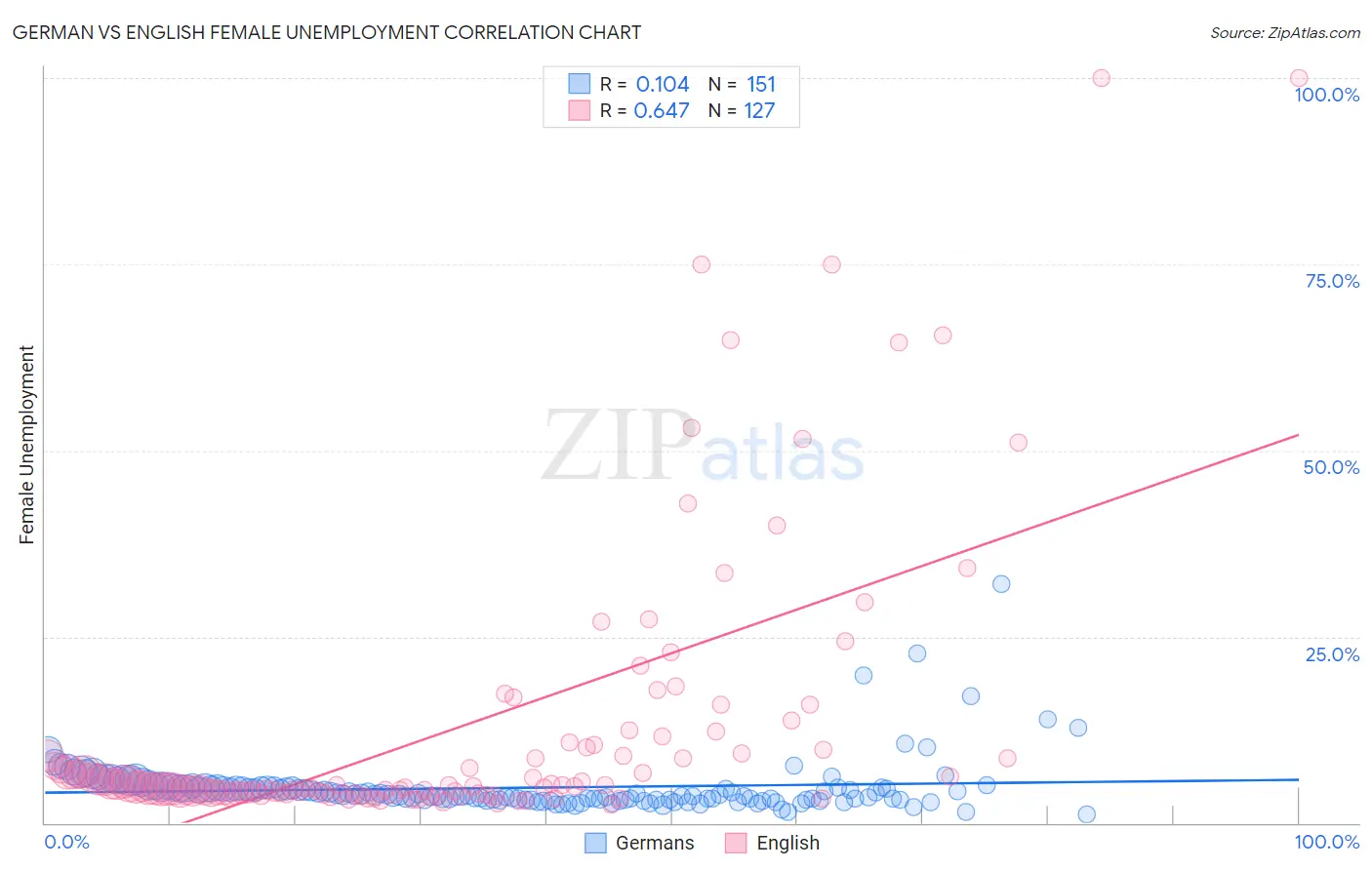German vs English Female Unemployment
COMPARE
German
English
Female Unemployment
Female Unemployment Comparison
Germans
English
4.5%
FEMALE UNEMPLOYMENT
100.0/ 100
METRIC RATING
8th/ 347
METRIC RANK
4.6%
FEMALE UNEMPLOYMENT
100.0/ 100
METRIC RATING
15th/ 347
METRIC RANK
German vs English Female Unemployment Correlation Chart
The statistical analysis conducted on geographies consisting of 564,194,310 people shows a poor positive correlation between the proportion of Germans and unemploymnet rate among females in the United States with a correlation coefficient (R) of 0.104 and weighted average of 4.5%. Similarly, the statistical analysis conducted on geographies consisting of 563,002,519 people shows a significant positive correlation between the proportion of English and unemploymnet rate among females in the United States with a correlation coefficient (R) of 0.647 and weighted average of 4.6%, a difference of 3.4%.

Female Unemployment Correlation Summary
| Measurement | German | English |
| Minimum | 1.1% | 2.5% |
| Maximum | 32.1% | 100.0% |
| Range | 31.0% | 97.5% |
| Mean | 4.7% | 12.9% |
| Median | 3.8% | 5.0% |
| Interquartile 25% (IQ1) | 3.2% | 4.1% |
| Interquartile 75% (IQ3) | 4.7% | 10.5% |
| Interquartile Range (IQR) | 1.5% | 6.4% |
| Standard Deviation (Sample) | 3.7% | 19.0% |
| Standard Deviation (Population) | 3.6% | 18.9% |
Demographics Similar to Germans and English by Female Unemployment
In terms of female unemployment, the demographic groups most similar to Germans are Chinese (4.5%, a difference of 0.020%), Slovene (4.5%, a difference of 0.36%), Swedish (4.4%, a difference of 0.79%), Swiss (4.6%, a difference of 1.7%), and Scandinavian (4.6%, a difference of 1.8%). Similarly, the demographic groups most similar to English are Finnish (4.6%, a difference of 0.20%), Belgian (4.6%, a difference of 0.79%), Carpatho Rusyn (4.7%, a difference of 0.85%), Croatian (4.7%, a difference of 0.87%), and Dutch (4.6%, a difference of 0.94%).
| Demographics | Rating | Rank | Female Unemployment |
| Norwegians | 100.0 /100 | #1 | Exceptional 4.2% |
| Czechs | 100.0 /100 | #2 | Exceptional 4.4% |
| Luxembourgers | 100.0 /100 | #3 | Exceptional 4.4% |
| Danes | 100.0 /100 | #4 | Exceptional 4.4% |
| Hmong | 100.0 /100 | #5 | Exceptional 4.4% |
| Swedes | 100.0 /100 | #6 | Exceptional 4.4% |
| Chinese | 100.0 /100 | #7 | Exceptional 4.5% |
| Germans | 100.0 /100 | #8 | Exceptional 4.5% |
| Slovenes | 100.0 /100 | #9 | Exceptional 4.5% |
| Swiss | 100.0 /100 | #10 | Exceptional 4.6% |
| Scandinavians | 100.0 /100 | #11 | Exceptional 4.6% |
| Dutch | 100.0 /100 | #12 | Exceptional 4.6% |
| Belgians | 100.0 /100 | #13 | Exceptional 4.6% |
| Finns | 100.0 /100 | #14 | Exceptional 4.6% |
| English | 100.0 /100 | #15 | Exceptional 4.6% |
| Carpatho Rusyns | 99.9 /100 | #16 | Exceptional 4.7% |
| Croatians | 99.9 /100 | #17 | Exceptional 4.7% |
| Latvians | 99.9 /100 | #18 | Exceptional 4.7% |
| Poles | 99.9 /100 | #19 | Exceptional 4.7% |
| Bulgarians | 99.9 /100 | #20 | Exceptional 4.7% |
| Fijians | 99.9 /100 | #21 | Exceptional 4.7% |